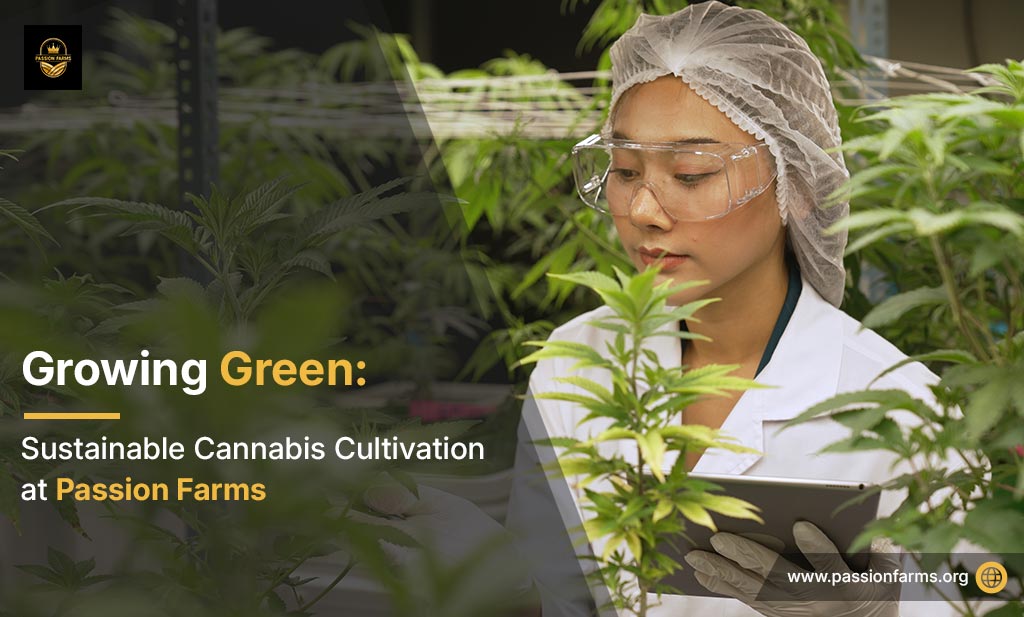At Passion Farms, as the cannabis industry continues its rapid growth and mainstream acceptance, there is an increasing focus on its environmental footprint. Traditional cultivation methods can be resource-intensive, consuming significant amounts of water and energy, and potentially contributing to pollution. However, a growing movement within the industry is championing sustainable cannabis cultivation practices, and Passion Farms is proud to be at the forefront, aiming to minimize environmental impact while producing the highest quality products. This blog post will explore the importance of sustainable cannabis farming, highlight key eco-friendly practices we employ, and discuss how consumers can support a greener future for cannabis by choosing Passion Farms.
The Environmental Impact of Cannabis Cultivation
Before delving into our sustainable solutions, it’s crucial to understand the environmental challenges posed by conventional cannabis cultivation. At Passion Farms, we are acutely aware of these issues and actively work to mitigate them:
•Water Consumption: Cannabis is a thirsty crop, especially when grown indoors or in arid regions. Large-scale operations can put a strain on local water resources. We implement advanced water-saving techniques to minimize our footprint.
•Energy Consumption: Indoor cultivation, which often relies on artificial lighting, climate control, and ventilation systems, is highly energy-intensive. This can lead to significant carbon emissions if the energy is sourced from fossil fuels. Passion Farms invests in energy-efficient solutions and renewable energy where possible.
•Pesticide and Fertilizer Use: Conventional farming often uses synthetic pesticides and fertilizers, which can contaminate soil and water, harming ecosystems and potentially leaving residues in the final product. We strictly adhere to organic and natural pest management strategies.
•Waste Generation: Cultivation generates various waste products, including plant material, packaging, and used growing media. We prioritize waste reduction, recycling, and composting.
•Land Degradation: Outdoor cultivation, if not managed properly, can lead to soil erosion, nutrient depletion, and habitat destruction. Our farming practices are designed to enhance soil health and protect local ecosystems.
Principles of Sustainable Cannabis Cultivation at Passion Farms
Passion Farms’ sustainable cannabis cultivation aims to mitigate these impacts by adopting practices that conserve resources, protect ecosystems, and promote long-term environmental health. Our core principles include:
•Resource Efficiency: We relentlessly work to minimize the use of water, energy, and other inputs across all our operations.
•Waste Reduction and Recycling: We implement comprehensive strategies to reduce waste and recycle materials, from cultivation to packaging.
•Soil Health and Biodiversity: We are dedicated to promoting healthy soil ecosystems and protecting local biodiversity, recognizing that healthy soil is the foundation of healthy plants.
•Integrated Pest Management (IPM): We utilize natural and biological controls to manage pests, significantly reducing our reliance on synthetic chemicals, ensuring a pure product.
•Renewable Energy: We are actively transitioning to clean energy sources to power our cultivation operations, striving for a truly green footprint.
Key Eco-Friendly Practices in Cannabis Farming
1. Water Conservation
Water is a precious resource, and at Passion Farms, we employ various cutting-edge techniques to reduce consumption and ensure responsible water stewardship:
•Drip Irrigation: This precise method delivers water directly to the plant roots, minimizing evaporation and runoff compared to traditional overhead watering. This ensures our plants get exactly what they need, without waste.
•Recycling and Recirculating Systems: Our advanced hydroponic and aeroponic systems are designed to recirculate nutrient-rich water, significantly reducing water waste and maximizing efficiency.
•Rainwater Harvesting: We actively collect and store rainwater for irrigation, reducing our reliance on municipal water sources and embracing natural resources.
•Water-Efficient Cultivars: We carefully select cannabis strains that are naturally more drought-tolerant, aligning our genetics with our commitment to water conservation.
2. Energy Efficiency and Renewable Energy
Reducing energy consumption is critical, especially for indoor grows, and Passion Farms is committed to leading the way:
•LED Lighting: We utilize high-efficiency LED grow lights that consume significantly less energy and produce less heat than traditional HPS (High-Pressure Sodium) lights, thereby reducing our cooling demands and overall energy footprint.
•Optimized HVAC Systems: We have invested in and optimized energy-efficient heating, ventilation, and air conditioning (HVAC) systems to maintain ideal growing conditions with minimal energy expenditure.
•Natural Light Utilization: Where feasible, we design our greenhouses and hybrid systems to maximize natural sunlight, reducing the need for artificial lighting and harnessing the power of the sun.
•Solar and Wind Power: Passion Farms is actively investing in on-site renewable energy sources like solar panels and exploring wind turbines to power our cultivation facilities, moving towards energy independence.
•Geothermal Systems: We are exploring and implementing geothermal systems to utilize the earth’s stable temperature for heating and cooling, which can drastically cut energy use and further reduce our environmental impact.
3. Soil Health and Organic Practices
For our outdoor and greenhouse cultivation, maintaining healthy soil is paramount. At Passion Farms, we believe that healthy soil leads to healthy plants and superior products:
•Composting: We use our own organic compost to enrich soil with vital organic matter, improving water retention and nutrient availability naturally.
•Cover Cropping: We plant non-cash crops between cannabis cycles to prevent erosion, suppress weeds, and naturally add nutrients back into the soil, enhancing its vitality.
•No-Till Farming: We minimize soil disturbance to preserve soil structure and microbial life, fostering a thriving underground ecosystem.
•Organic Fertilizers: We exclusively use natural fertilizers like worm castings, bone meal, and fish emulsion instead of synthetic chemicals, ensuring our plants are nourished purely.
•Crop Rotation: We practice crop rotation with other beneficial plants to break pest cycles and replenish soil nutrients, maintaining long-term soil fertility.
4. Integrated Pest Management (IPM)
IPM is a holistic approach to pest control that minimizes the use of synthetic pesticides, a cornerstone of our commitment to clean cannabis:
•Beneficial Insects: We introduce natural predators (e.g., ladybugs, predatory mites) to control pest populations, letting nature do its work.
•Biological Controls: We use naturally derived substances, such as neem oil or microbial sprays, to deter pests, ensuring no harmful chemicals are used.
•Physical Barriers: We employ netting and other physical barriers to prevent pests from entering cultivation areas, providing a first line of defense.
•Regular Monitoring: Our team conducts consistent scouting for pests and diseases to catch infestations early, allowing for immediate and natural intervention.
5. Waste Management and Packaging
Reducing waste throughout the supply chain is another key aspect of sustainability at Passion Farms:
•Composting Plant Waste: We turn discarded plant material into nutrient-rich compost for future growth, creating a closed-loop system.
•Recyclable and Biodegradable Packaging: We are committed to using packaging made from recycled content, biodegradable materials, or innovative compostable plastics to minimize our environmental footprint [7].
•Minimal Packaging: We design our packaging to use the least amount of material necessary while still protecting the product, reducing unnecessary waste.
The Role of Certifications and Consumer Choice:
As consumer awareness of sustainable practices grows, certifications are emerging to help identify environmentally responsible cannabis products. Passion Farms aligns with the spirit of organizations like Sun+Earth Certified, which promote regenerative, outdoor, and sun-grown cannabis, emphasizing ecological stewardship and fair labor practices .
Consumers can support sustainable cannabis by:
•Choosing Certified Products: Look for products with sustainability certifications, and know that Passion Farms strives for the highest standards.
•Supporting Local Growers: By choosing Passion Farms, you reduce the carbon footprint associated with transportation and support local, responsible agriculture.
•Asking Questions: We encourage you to inquire about our cultivation practices; we are transparent about our commitment to sustainability.
•Opting for Outdoor/Greenhouse Grown: Passion Farms prioritizes these methods, as they generally have a lower energy footprint than indoor grows, contributing to a healthier planet.
Conclusion
Sustainable cannabis cultivation is not just an environmental ideal; it’s a practical and increasingly necessary approach for the industry’s long-term viability. At Passion Farms, we are dedicated to leading this charge. By embracing water and energy conservation, promoting soil health, implementing integrated pest management, and minimizing waste, we significantly reduce our ecological impact while delivering premium cannabis products. As consumers become more discerning, supporting brands committed to these eco-friendly practices, like Passion Farms, will drive the industry towards a greener, more responsible future, ensuring that the benefits of cannabis can be enjoyed without compromising the health of our planet. Choose Passion Farms for a product you can feel good about – cultivated with care, for you and for the Earth.
Contact us for all your premium Cannabis products and THCA distributing services across the U.S.




